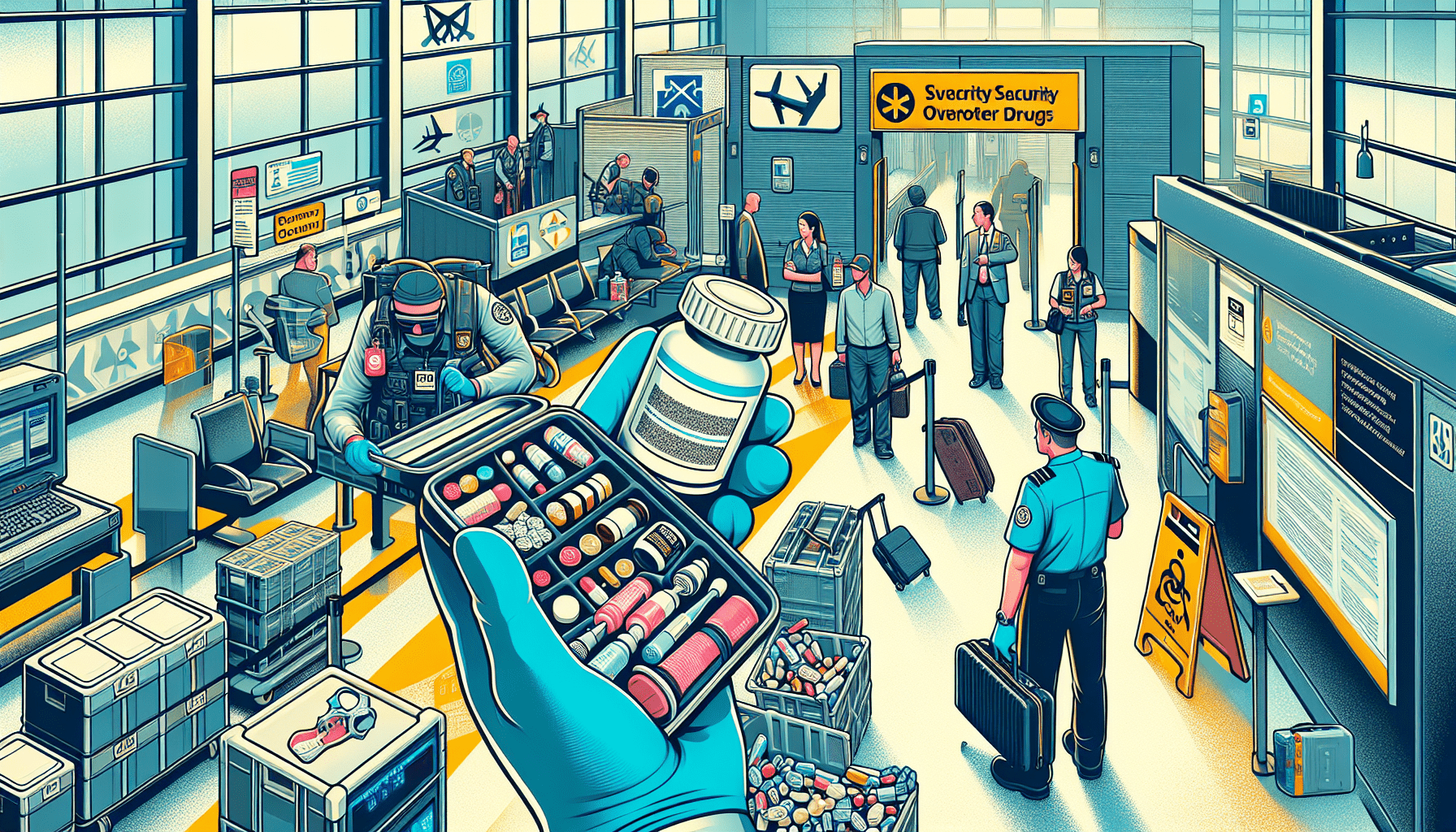European Travel Plug Adapter USB C, TESSAN International Plug Adapter with 4 AC Outlets and 3 USB Ports, Type C Power Adaptor Charger for US to Most of Europe Iceland Spain Italy France Germany
$15.99 (as of December 24, 2024 22:01 GMT +00:00 - More infoProduct prices and availability are accurate as of the date/time indicated and are subject to change. Any price and availability information displayed on [relevant Amazon Site(s), as applicable] at the time of purchase will apply to the purchase of this product.)When traveling, it’s important to pack your medication along with your other essentials. The Transportation Security Administration (TSA) generally allows various types of medicines to be brought through security without question. However, powdered medicines, like some laxatives, can be tricky to take through airport security. TSA may confiscate your powdered remedies due to the potential threat of explosives. While the U.S. still allows powders in most cases, carrying large quantities could result in additional screening. To avoid any hassle, it’s best to pack powdered medication in your checked baggage or travel with an unopened, travel-sized container. If you have a large amount of medicine, remove it from your bag to help speed up the screening process. So, be cautious when bringing powdered medicine through TSA to ensure a smooth trip.
Shop These Accessories for a Comfortable Trip
Why is it important to be cautious when bringing over-the-counter medicine through TSA?
Medicine is essential for travel
When it comes to traveling, packing medicine is just as important as packing your phone and a change of clothes. Over-the-counter medicines can help alleviate common travel ailments such as a headache or upset stomach, while prescriptions are crucial for managing more serious health conditions. The Transportation Security Administration (TSA) recognizes the importance of medicine and generally allows passengers to bring various types of medication through security.
TSA regulations on medicines
The TSA requires that all medicines undergo X-ray screening, similar to any other carry-on item. As long as the medicines are medically necessary, TSA agents will typically allow pills, tablets, and other medication forms through security without questioning. In fact, certain liquid medications like insulin and medicated syrups are exempt from TSA’s liquid rules.
Potential issues with powdered medicines
While most forms of medication can easily pass through TSA security checkpoints, powdered medicines can be a bit more complicated. Certain powdered substances, including some laxatives, can closely resemble substances that have the potential to be used in creating explosives. In response to past terrorist plots, some security agencies, like those in Indian airports, have banned talcum powders altogether from passenger handbags. Although TSA in the U.S. still allows powders in most cases, carrying large quantities of powdered medication could result in additional airport screening.
Importance of being aware of TSA regulations
It is crucial for travelers to be aware of TSA regulations when it comes to bringing over-the-counter medicines through security. Failing to adhere to these regulations can not only result in the confiscation of your powdered medicine but also cause difficulties in finding replacements. Additionally, travelers flying into the U.S. from other countries may also be impacted by these regulations, so it is important to plan ahead and be cautious.
Why do powders get flagged by TSA?
Powders can be used to create explosives
The primary reason why powders, including powdered medicines, get flagged by TSA is due to their potential use in creating explosives. Just like certain liquids, powders have been utilized in terrorist plots in the past. The resemblance between harmless powdered substances and potentially dangerous ones can cause concern among TSA agents.
Terrorist plots involving powdered chemicals
To mitigate the risk of explosives being brought onto planes, security agencies have implemented restrictions on powders in carry-on luggage. These measures are in response to previous terrorist plots involving powdered chemicals being smuggled on planes with the intention of causing harm. By restricting powders, security agencies aim to enhance the safety of air travel.
Restrictions on powders in carry-on luggage
While TSA in the U.S. still allows powders through its security checkpoints in most cases, powders can be subject to additional screening, especially if carried in large quantities. It is important to note that carrying a large amount of powdered medication could potentially result in delays during the screening process. Additionally, travelers flying directly into the U.S. from another country may also be impacted by these restrictions.
Indian airports’ ban on talcum powders
One example of the restrictions on powders is the ban on talcum powders in passenger handbags at Indian airports. This ban was implemented in 2023 as a response to security concerns. Travelers should be aware that different countries may have varying regulations regarding powders, and it is important to research and comply with these regulations when traveling internationally.

Shop These Accessories for a Comfortable Trip
How should powdered medicine be packed?
Keeping it in checked baggage is the best option
To avoid potential hassle and additional screening, the best way to pack powdered medicine is to keep it in your checked baggage. By doing so, you can bypass the need for special inspection in the already time-consuming security line.
Inspections during routine security screenings
If you choose to pack your powdered medicine in your carry-on bag, it is important to expect that it will be inspected during routine security screenings. TSA agents may need to take a closer look at the powder, ensuring its safety. Travelers should cooperate with the agents and be prepared for potential delays during the screening process.
Importance of using labeled packaging
When traveling with powdered medicine, it is crucial to keep it in its original packaging. This includes ensuring that the container is properly labeled with the necessary information. Non-labeled bottles or containers may raise suspicion and could potentially result in the confiscation of the medicine.
Traveling with unopened containers
Whenever possible, traveling with an unopened container of powdered medicine is recommended. Although TSA agents have the authority to break the seal and inspect the contents of a container, having an unopened package can help minimize potential concerns and expedite the screening process.
Benefits of travel-sized packages
Opting for travel-sized packages of powdered medicine can also be beneficial. TSA rules state that powders greater than 12 ounces are subject to additional screening. By choosing smaller quantities of medicine, travelers can typically pass through the X-ray machine without further testing, reducing the likelihood of delays.
Additional screening for powders greater than 12 ounces
It is important to note that powders greater than 12 ounces are subject to additional screening. Travelers should be prepared for potential delays and be patient during the screening process. Cooperating with TSA agents and following their instructions can help make the process smoother.
Removing large amounts of medicine for faster screening
If you do choose to travel with a large amount of powdered medicine, it can be helpful to remove the item from your bag and notify a security officer at the airport checkpoint. Doing so can help expedite the screening process and avoid any unnecessary delays. Being proactive and cooperative will ultimately make the experience smoother for both the traveler and the TSA personnel.
What are the potential consequences of not being cautious?
Confiscation of powdered medicine
One of the potential consequences of not being cautious when bringing powdered medicine through TSA is the confiscation of the medication. If a TSA agent determines that the powder is not compliant with regulations or raises suspicion, they may confiscate it. This can be particularly troublesome if the medicine is essential for managing a health condition or if it is not easily replaceable.
Difficulties in finding replacements
If powdered medicine is confiscated by TSA, travelers may face difficulties in finding immediate replacements, especially if they are in a foreign country or unfamiliar location. It is important to have a backup plan or alternative options in case the medicine is not allowed through security.
Impact on travelers flying into the U.S. from other countries
Not being cautious with powdered medicine can also impact travelers flying into the U.S. from other countries. TSA regulations and restrictions apply to international travelers as well, and failing to comply with these regulations can result in delays or confiscation of medication. It is essential for all travelers to be aware of and adhere to TSA regulations regardless of their point of origin.

Tips for navigating TSA regulations with medicine
Checking TSA guidelines before traveling
Before embarking on any trip, it is important to check the TSA guidelines regarding the transportation of medicine. TSA’s website provides detailed information on what types of medicine are allowed and any specific regulations or restrictions that apply. By familiarizing yourself with these guidelines, you can ensure a smoother experience at security checkpoints.
Contacting TSA for specific concerns
If you have specific concerns or questions regarding the transportation of your medicine through TSA checkpoints, it is recommended to contact TSA directly. They can provide accurate and up-to-date information based on your individual situation. By reaching out to TSA, you can address any concerns and clarify any doubts you may have.
Consulting with a healthcare professional
If you are unsure about the regulations or have concerns about traveling with your medicine, it is advisable to consult with a healthcare professional. They can provide guidance based on your specific medications, health conditions, and travel plans. Your healthcare professional can offer recommendations on how to ensure that your medicine is properly packed and comply with TSA regulations.
Properly labeling and organizing medicines
To avoid any confusion or suspicion, it is important to properly label and organize your medicines when traveling. Keep them in their original packaging whenever possible, and make sure that the labels are legible and provide all necessary information. Organizing your medicines in a clear and organized manner can help expedite the screening process and minimize potential issues.
Carrying necessary medical documentation
It is always a good idea to carry necessary medical documentation when traveling with medication. This can include prescriptions, doctor’s notes, or any other relevant documents that explain the need for the medicine. Having these documents readily available can help provide clarity and assurance to TSA agents if any questions or concerns arise during the screening process.
Additional considerations for international travel
Researching specific country regulations
When traveling internationally, it is essential to research and understand the specific regulations of the countries you will be visiting. Different countries may have different rules and restrictions regarding medication, including powders. Researching in advance can help ensure that you comply with local regulations and avoid any potential issues at customs or security checkpoints.
Properly declaring medicines at customs
When arriving in a foreign country, it is important to properly declare any medicines you are carrying at customs. Some countries may require you to fill out a customs declaration form or provide additional information about the medications you are carrying. Failing to declare your medications can result in penalties or confiscation of the medicine.
Translations of medicine names and prescriptions
If you are traveling to a country where English may not be the primary language, it can be helpful to have translations of your medicine names and prescriptions. This can assist in communicating with local authorities or healthcare professionals if any issues arise. Carrying a translation or a list of generic names can help ensure that you can obtain the necessary medication if needed.
Carrying a copy of prescriptions
In addition to translations, it is also advisable to carry copies of your prescriptions when traveling. This can serve as proof of the necessity of the medication and can facilitate obtaining replacements if needed. Having copies of prescriptions can also be useful in case of any medical emergencies while traveling, allowing healthcare professionals to better understand your medical history.
Being prepared for language barriers
When traveling internationally, it is important to be prepared for potential language barriers. Familiarize yourself with common medical terms or phrases in the local language to assist in communicating about your medication if necessary. Consider carrying a phrasebook or using translation apps on your phone to facilitate communication if needed.
What to do if medicine is confiscated by TSA
Remaining calm and cooperative
If your medicine is confiscated by TSA, it is important to remain calm and cooperative throughout the process. Getting upset or argumentative will not change the situation and may only lead to further difficulties. By staying calm and cooperative, you can navigate the situation more effectively.
Requesting a secondary screening
In some cases, it may be possible to request a secondary screening of your medicine. This can provide an opportunity for further inspection or clarification, potentially leading to the approval of the medicine. However, it is important to note that TSA has the final authority to determine whether the medicine will be allowed through or not.
Explaining the necessity of the medicine
If your medicine is confiscated, it can be helpful to explain the necessity of the medication to the TSA agent. Provide any relevant medical documentation, prescriptions, or notes from healthcare professionals to support your case. While there is no guarantee that this will result in the approval of the medicine, it can potentially help TSA understand the importance of the medication.
Seeking assistance from a supervisor
If you feel that your confiscated medicine should have been allowed or if you encounter any issues or concerns during the screening process, it is advisable to seek assistance from a TSA supervisor. They can provide further guidance and review the situation to ensure that the correct procedures are followed.
Getting a receipt for confiscated items
If your medicine is confiscated by TSA, it is important to request a receipt for the confiscated items. This will serve as documentation of the incident and can be useful for any potential follow-up or insurance claims. Having a receipt can also help in obtaining replacements for the confiscated medicine.
Alternative options for accessing medicine during travel
Researching local pharmacy options
If your powdered medicine is confiscated or if you are unable to bring it with you, it is important to research local pharmacy options at your destination. Identify nearby pharmacies or medical facilities where you can obtain the necessary medicine. Keep in mind that availability and regulations may vary from country to country, so it is important to plan ahead and have backup options.
Using telemedicine services
Telemedicine services can be a convenient alternative for accessing medical advice and obtaining prescriptions while traveling. With the help of technology, you can consult with healthcare professionals remotely and receive guidance on managing your condition or finding suitable replacements for your medicine. Research telemedicine options before your trip to ensure that you have access to these services if needed.
Contacting healthcare providers for recommendations
If you encounter difficulties in accessing your medicine while traveling, it can be helpful to contact your healthcare providers for recommendations. They may be able to provide alternative solutions or suggest local resources that can assist you. It is always important to consult with healthcare professionals for personalized advice based on your specific health needs.
Carrying a small emergency supply
To prepare for unforeseen circumstances, consider carrying a small emergency supply of your essential medicines. This can help bridge the gap until you can obtain replacements or access suitable alternatives. Be mindful of any expiration dates and ensure that the emergency supply is within legal limits and compliant with TSA regulations.
Considering travel insurance
Travel insurance that includes coverage for medical emergencies can provide additional peace of mind when traveling with medicine. Check the policy terms and conditions to ensure that your medications are covered, and understand any limitations or exclusions that may apply. Having travel insurance can provide financial protection in case of medication-related issues or emergencies during your trip.
Conclusion
Being cautious when bringing over-the-counter medicine through TSA is of utmost importance for smooth and hassle-free travel. Understanding TSA regulations, especially regarding powdered medicines, can help prevent confiscation and avoid potential difficulties. By following guidelines, properly packing and labeling your medicines, and carrying necessary medical documentation, you can navigate TSA security checkpoints with ease. Additionally, researching international regulations, declaring medicines at customs, and considering alternative options can further enhance your travel experience. By planning ahead and being aware of the potential consequences, you can ensure a safe and stress-free journey.
Shop These Accessories for a Comfortable Trip






